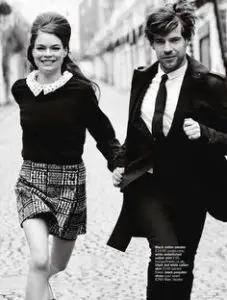
FULL POEM - SCROLL DOWN FOR LINE-BY-LINE ANALYSIS
Grand-dad, they say you’re old and frail,
Your stocked legs begin to fail:
Your knobbed stick (that was my horse)
Can scarce support your bended corse,
While back to wall, you lean so sad,
I’m vexed to see you, dad.
You used to smile and stroke my head,
And tell me how good children did;
But now, I wot not how it be,
You take me seldom on your knee,
Yet ne’ertheless I am right glad,
To sit beside you, dad.
How lank and thin your beard hangs down!
Scant are the white hairs on your crown;
How wan and hollow are your cheeks!
Your brow is rough with crossing breaks;
But yet, for all his strength be fled,
I love my own old dad.
The housewives round their potions brew,
And gossips come to ask for you;
And for your weal each neighbour cares,
And good men kneel, and say their prayers;
And everybody looks so sad,
When you are ailing, dad.
You will not die and leave us then?
Rouse up and be our dad again.
When you are quiet and laid in bed,
We’ll doff our shoes and softly tread;
And when you wake we’ll aye be near
To fill old dad his cheer.
When through the house you shift your stand,
I’ll lead you kindly by the hand;
When dinner’s set I’ll with you bide,
And aye be serving at your side;
And when the weary fire turns blue,
I’ll sit and talk with you.
I have a tale both long and good,
About a partlet and her brood,
And cunning greedy fox that stole
By dead of midnight through a hole,
Which slyly to the hen-roost led –
You love a story, dad?
And then I have a wondrous tale
Of men all clad in coats of mail,
With glittering swords – you nod, I think?
Your fixed eyes begin to wink;
Down on your bosom sinks your head –
You do not hear me, dad.

LINE-BY-LINE ANALYSIS
STANZA 1
GRAND-DAD , they say you’re old and frail,
The poem begins with the narrator addressing his Grandad and the first thing he associates with him – age and weakness. The ‘they say’ hints that this association comes from outside influences.
Your stiffened legs begin to fail:
This line emphasises the physical demise of old age and contrasts the man’s current state of ‘failed’ legs to before the decline occurred.
Your staff, no more my pony now,
‘no more my pony now’ is nostalgic as the narrator reminisces upon times when his cane would be used in games.
Supports your body bending low,
The imagery of his ‘body bending low’ can be viewed literally as well as metaphorically for his downfall from a strong to an old man.
While back to wall you lean so sad,
This line suggests that either the narrator’s words of old age and nostalgia make the man sad or just old age also brings psychological struggles too.
I’m vex’d to see you, Dad.
The depression of the man is rubbing off on the child here as ‘vex’d’ means frustrated.
STANZA 2
You used to smile and stroke my head,
The nostalgia is repeated in the second stanza and becomes a motif of the poem as the child continues to reminisce.
And tell me how good children did;
Simplified, this line basically refers to the Grandad explaining how his grandchild can be a good child and well behaved. It’s the classic relationship at play of a wise old man passing on the wisdom he’s accumulated.
But now, I wot not how it be,
‘wot’is old English for know. Baillie creates a tone shift in the poem with ‘but now’ plunging the reader back into a perhaps sadder reality after the aforementioned reminiscing
You take me seldom on your knee,
Yet ne’ertheless I am right glad,
The end of the second stanza is really endearing as we get a glimpse of the love between them and how the child still loves the man despite his old age and lack of excitement that ensues.
To sit beside you, Dad.
‘Dad’ is repeated as the last word of the last line in the majority of stanzas and makes the poem more emotive and personal by deepening the connection between them.
STANZA 3
How lank and thin your beard hangs down!
Scant are the white hairs on your crown:
How wan and hollow are your cheeks,
Your brow is crossed with many streaks;
These four lines all focus on the imagery of describing the man. ‘Lank’ refers to his beard being long, limp, and straight – imagery of weakness which further reinforces the idea of old age and fragility. It is as if his masculinity ebbs as the fullness of his beard, head of hair, and cheeks all decrease.
But yet although his strength be fled,
More simply put, ‘strength be fled’ means his strength has gone.
I love my own old Dad.
Baillie incorporates the word ‘own’ to make the end of this stanza even more personal as it is a personal pronoun.
STANZA 4
The housewives round their potions brew,
The poem and its narrator broadens focus, now looking at the women around him and their cooking. ‘Potions’ is a reference to witchcraft which, above all, illustrates the youthful imagination of the young narrator.
And gossips come to ask for you;
And for your weal each neighbour cares;
And good men kneel and say their prayers,
And every body looks so sad,
These four lines are a continuous list. It is an example of polysyndeton which emphasies the extent of care and attention directed at the old man. The fact that men are ‘kneeling’ and ‘everybody looks so sad’ could symbolise and foreshadow the death and funeral of the man
When you are ailing, Dad.
‘ailing’ means in poor health.
STANZA 5
You will not die and leave us then?
The child is almost begging him to stay alive. It is a rhetorical question that highlights the child’s lack of control over it as well as his desperation.
Rouse up and be our Dad again.
‘Rouse up’ suggests the man has been sleeping. This could be a metaphor for death or his inability to contribute to their lives like he once could.
When you are quiet and laid in bed,
We’ll doff our shoes and softly tread;
These two lines are somewhat of a negotiation between the child and his granddad – the deal being he’ll continue to live if they are quiet around him when he is sleeping.
And when you wake we’ll still be near,
To fill old Dad his cheer.
These two lines are intended to comfort the old man when he wakes up and the ‘cheers’ he will receive may be a motivating factor for him to wake up at all.
STANZA 6
When through the house you change your stand,
This stanza is an optimistic narrative created by the child if, indeed his negotiations are successful.
I’ll lead you kindly by the hand:
This is a kind-hearted, emotive piece of imagery and in this situation, the child is placing themselves in the carer position which is a role reversal to the past.
When dinner’s set I’ll with you bide,
And aye be serving by your side;
‘Bide’ means that the child will stay with the granddad – in the narrative the child is constantly reassuring the man with ‘hand-holding’ or simply their presence.
And when the weary fire burns blue,
Baillie utilizes the imagery of the fire and that it is ‘weary’ to mirror the old age of the man.
I’ll sit and talk with you.
The use of personal pronouns ‘I’ and ‘you’ again makes the connection between them super personal. It’s like there is no one else around just the two of them.
STANZA 7
I have a tale both long and good,
The role reversals continue here as it is now the child telling the stories to his grandfather.
About a partlet and her brood,
A ‘partlet and her brood’ is old English for a woman and her children.
And greedy cunning fox that stole
By dead of midnight through a hole,
Which slyly to the hen-roost led,–
This is a small insight into one of the child’s stories. Baillie’s choice to include this story of the fox stealing a hen could be a metaphor for death or old age and how the granddad is being stolen away from his family as a result.
You love a story, Dad?
This is a rhetorical question – the child knows how his Grandad loved sharing a story now he wants to return the enjoyment he’s gained from hearing them.
STANZA 8
And then I have a wondrous tale
Of men all clad in coats of mail,
The child offers another story for his Grandad, now one with knights and swords.
With glittering swords,–you nod,–I think
‘I think’ creates an element of uncertainty as to whether the old man is present and listening. The caesura increases the uncertainty and the pause it adds creates suspense.
Your heavy eyes begin to wink;–
The fact that his eyes are ‘heavy’ suggests they may never reopen.
Down on your bosom sinks your head:–
The man’s head falls down on his chest making the reader pretty sure he’s just died.
You do not hear me, Dad.
The final line is tragic and saddening – it gives an insight into the feelings of the child and depicts his coming to terms with his granddad’s death which is very emotive. Again, the direct address of ‘Dad’ and the personal pronoun ‘you’ make his death even more personal and poignant.


